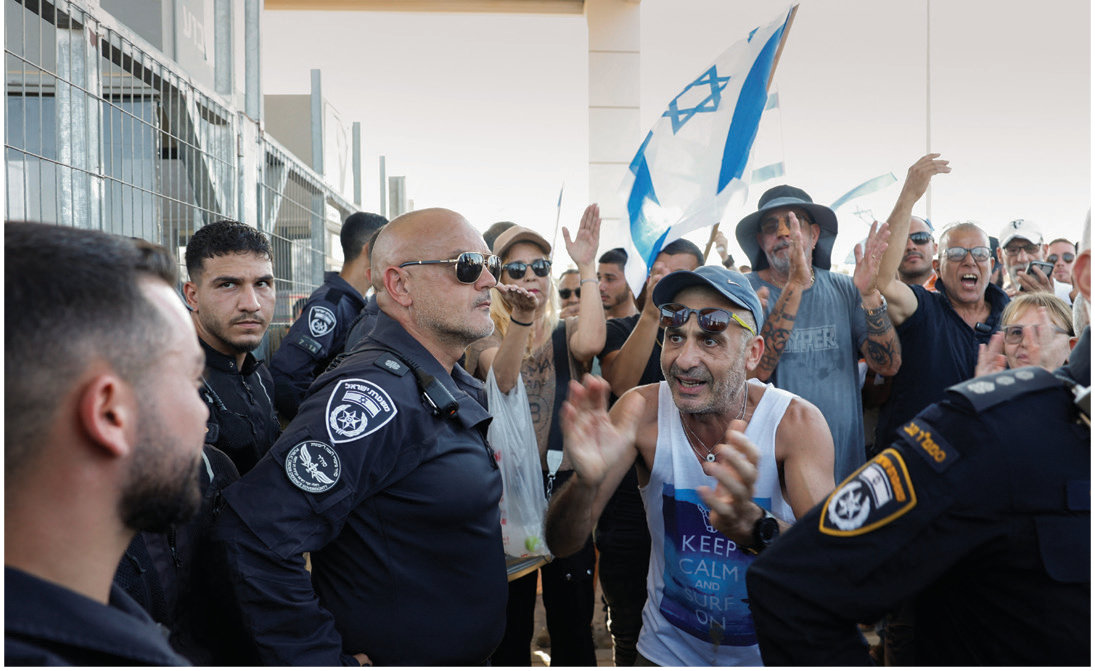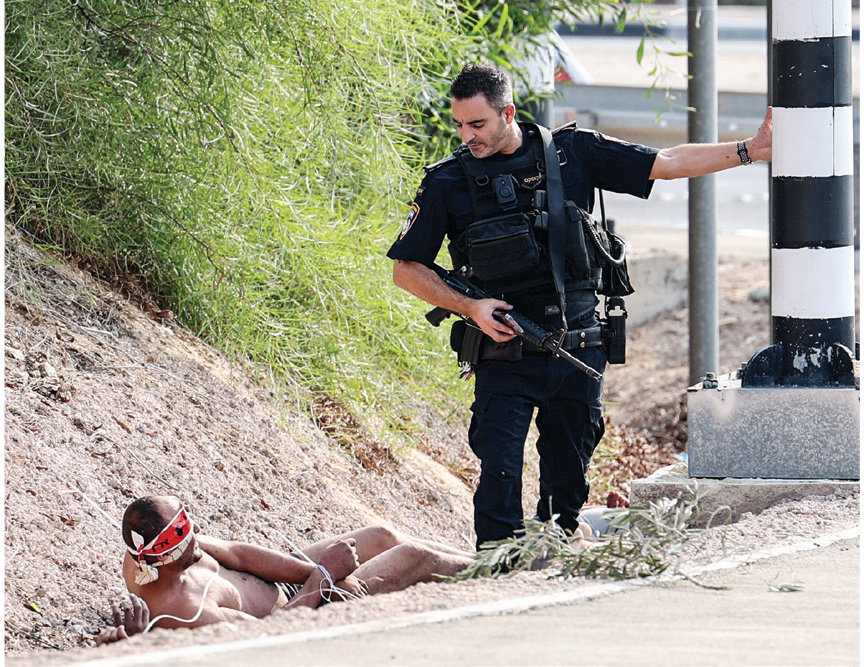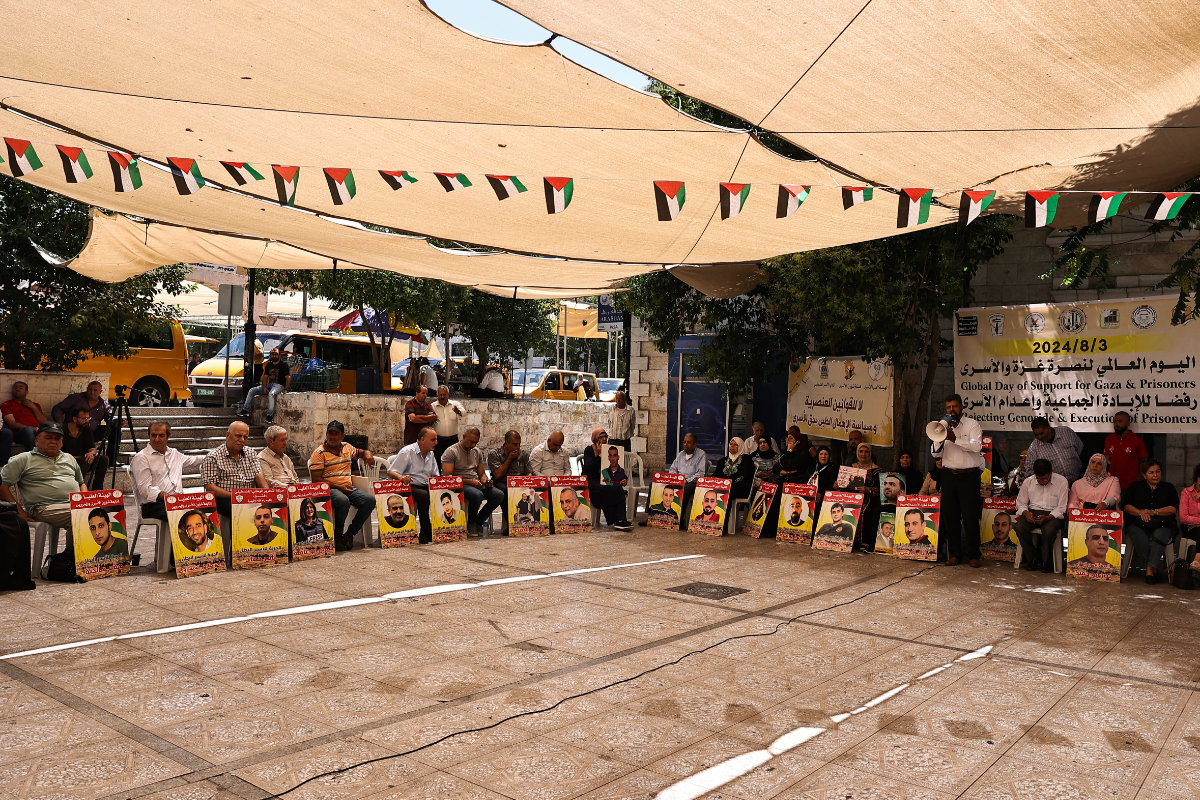ATHENS: Southern Israel’s Sde Teiman detention facility was rocked by protests on Monday when dozens of protestors — including several far-right members of the Knesset — clashed with military police.
The protestors, waving Israeli flags and chanting “shame,” were condemning the arrest and detention of nine Israel Defense Forces reservists accused of subjecting a detained Palestinian man to abuse so severe it resulted in his hospitalization.

Protests have been held in support of the detained reservists despite mounting allegations of the maltreatment of Palestinians. (Reuters/AFP)
As domestic political tensions continue to rise and the war in Gaza shows no sign of stopping, many are wondering whether the widely reported torture of Palestinians in Israeli custody will only deepen the political rift in Israel.
The protest at Sde Teiman was expected, especially given the rhetoric of Israeli lawmakers regarding the treatment of detained Palestinians. Israel’s far-right Minister of National Security Itamar Ben-Gvir took to X on Monday to post: “Take your hands off our reservists!”

For Israel's right-wing extremist finance minister Bezalel Smotrich, the military reservists charged with torturing and maltreating Palestinian prisoners are “heroes.” (AFP photo)
Some Israeli politicians’ brazen endorsement of torture is even more shocking. When asked by a fellow member of the Knesset whether there was any justification for sodomizing a detainee, Likud Party MK Hanoch Mildwidsky shouted: “Yes! If he is a Nukhba (Hamas militant), everything is legitimate to do!”
Bezalel Smotrich, the minister of finance, also condemned the arrests on X, demanding the release of the reservists — whom he called “IDF heroes” — and calling for those who ordered their arrest to be sacked.

This undated photo taken in the winter of 2023 and provided by Breaking the Silence, a whistleblower group of former Israeli soldiers, shows blindfolded Palestinians captured in the Gaza Strip in a detention facility on the Sde Teiman military base in southern Israel. (Breaking The Silence via AP)
Videos posted on social media also showed far-right parliamentarian Zvi Sukkot of the Religious Zionist Party and Heritage Minister Amichay Eliyahu of Otzma Yehudit entering the detention facility at Sde Teiman.
The Sde Teiman protest escalated after protestors realized the detained reservists were being held at the Beit Lid military base north of Tel Aviv, where they attempted to break into the detention center to release the soldiers.
Several members of the reservists’ unit also joined in the protest in full military uniform, though their faces were covered.

People lift placards bearing portraits of Palestinians currently detained by Israel during a protest in solidarity with them and with the residents of the Gaza Strip, in Ramallah city in the occupied West Bank on July 30, 2024. (AFP)
Allegations of the torture of Palestinian detainees by Israeli forces have been mounting for years — even more so since the Hamas-led Oct. 7 attack on southern Israel that sparked the ongoing war in Gaza.
The UN Office of the High Commissioner for Human Rights issued a report on Wednesday alleging the death of at least 53 Palestinian detainees in Israeli custody since the war began, as well as the use of waterboarding, electrocution, and sleep deprivation.
The Israel Prison Service has denied all of the allegations, claiming that Israeli prisons do not violate the rights of prisoners.
The OHCHR report added that more than 9,400 Palestinians had been detained in Israel from October to the end of June, many of whom had not been granted access to a lawyer.
Since Oct. 7, thousands of Palestinians — including medics, patients, residents and captured fighters — have been taken from Gaza to Israel, “usually shackled and blindfolded,” the OHCHR report said.
INNUMBERS
• 53 Palestinian detainees believed to have died in Israeli custody since Oct.7.
• 9,400 Palestinians detained in Israel from October to the end of June.
Source: OHCHR
Thousands more have been detained in the West Bank and Israel. “They have generally been held in secret, without being given a reason for their detention, access to a lawyer or effective judicial review,” OHCHR added.
Testimonies for the report suggested that Israel had subjected prisoners to “a range of appalling acts, such as waterboarding and the release of dogs on detainees,” UN human rights chief Volker Turk said in a statement accompanying the report.
Many released Palestinians reported treatment “including severe beatings, electrocution, being forced to remain in stress positions for prolonged periods, or waterboarding.” The report said detainees had been subjected to blackmail, “being burnt with cigarettes, and given hallucinogenic pills.”

Palestinian Faouzi Abdel Aal, 21, lies at the Nasser hospital in Khan Yunis in the southern Gaza Strip where he will receive treatment for his injuries, after being reportedly released from an Israeli detention center into Gaza via the Karem Shalom gate, on July 25, 2024. (AFP)
It said there were “reasonable grounds to believe” that since Oct. 7, Israel and Palestinian armed groups had “committed gross violations and abuses … of the rights to life, liberty and freedom from torture and other ill-treatment.”
These included the use of “rape and other forms of sexual violence,” warning the abuses may amount to war crimes. Besides calling for the abuses to cease, the OHCHR urged all parties to “immediately end all forms of arbitrary detention, including the holding of hostages.”
READ MORE
• The children in Israel’s prisons
• Palestinian detainees say they faced abuse in Israeli jails
• Rights advocates denounce ‘systemic abuse’ in Israeli prisons
• Israel does not need a death penalty — they execute us in the streets already, say Palestinians
A summary of the report referred to a “staggering” number of detainees — including men, women, children, journalists and human rights defenders.
“Detainees said they were held in cage-like facilities, stripped naked for prolonged periods, wearing only diapers. Their testimonies told of prolonged blindfolding, deprivation of food, sleep and water,” the summary said.

Bound and blindfolded Palestinian detainees are transported by Israeli soldiers in Gaza on Dec. 8, 2023. (Haaretz via AP/File)
Some detainees said that “their hands were tied and they were suspended from the ceiling,” while “some women and men also spoke of sexual and gender-based violence.”
According to the Prisoners Club, a Palestinian rights watchdog, around 9,600 Palestinians are currently held in Israeli jails, including hundreds under administrative detention where they can be kept for long periods without charge.
Not all Israelis have defended the alleged actions of the arrested reservists, nor do they support the use of torture and the violation of the human rights of Palestinian detainees.
“Are you in favor of rape? Is this part of Judaism?” Israeli human rights activist Yariv Oppenheimer replied to Belal Smotrich’s post on X.
Israeli writer Hen Mazzig condemned the protests, during which he said members of the media were verbally and physically assaulted.
“Israel’s investigation (of the reservists) must be allowed to proceed. This protest and the politicians encouraging it do NOTHING to help Israel. It only gives more material for those who hate us,” he posted on X on Monday.
Only a handful of Israeli government officials have condemned the protests and the storming of the detention facility, chief among them Defense Minister Yoav Gallant and Interior Minister Moshe Arbel.
“Even when angry, the laws apply to everyone — do not break into IDF bases and do not violate the laws of the State of Israel,” Gallant posted on X.
“I call on the Israeli Police to act immediately against the violators of the law and on all elected officials to refrain from irresponsible statements that drag the IDF into the political arena,” he said in a separate post.

Israeli soldiers and police clash with right wing protesters after they broke into the Beit Lid army base over the detention for questioning of military reservists who were suspected of abuse of a detainee, following the October 7 attack in Israel, on July 29, 2024 in Kfar Yona. (AFP)
In a statement on Monday, Herzi Halevi, chief of the general staff of the IDF, stated that the break-ins at IDF bases were “extremely serious and against the law.”
However, despite these condemnations, Israeli security forces at the IDF military bases were reportedly apathetic towards the protestors, and there have been no reported detentions or arrests of those involved.
The day after the protests saw a boisterous meeting in the Knesset after Prime Minister Benjamin Netanyahu condemned the mob that broke into IDF bases.
Despite attempts by right-wing activists and lawmakers alike to have the arrested reservists released, eight of the original 10 reservists had their detentions extended this morning and will remain in custody until Sunday, according to the IDF.
The suspects may face charges of aggravated sodomy, assault, and conduct unbecoming of a soldier, among other charges.






























